Research
Infographic
Recognizing Faculty with Disabilities: Data and Considerations from the Faculty Job Satisfaction Survey
Drawing upon Faculty Job Satisfaction Survey data from 2019 and 2020, this piece examines meaningful differences in perception of the academic workplace between faculty with visible disabilities, invisible disabilities, and no reported disabilities.
Case Study
Supporting the Next Generation of Faculty at Georgia State University
In this partner spotlight, Georgia State University shares how the institution applied its data-driven approach to student success to the faculty experience through the administration and rollout of the Faculty Job Satisfaction Survey.
Webinar
Success After Tenure: Lessons in Engaging Mid-Career Faculty
Based on the 2018 book, Success After Tenure: Supporting Mid-Career Faculty (Stylus), this webinar highlights the impetus behind compiling the volume, as well as the successful practices put in place by COACHE partners at Rochester Institute of Technology.
Browse Resources By Topic
- Faculty Development & Support
- Diversity, Equity, & Inclusion
- Higher Education Leadership
- Recruitment & Retention
- Work Life Balance
Benchmark Best Practices: Nature of Work: Research
Citation:
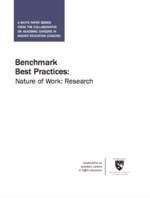
Abstract:
The COACHE surveys of college faculty produce data that are both salient to full-time college faculty and actionable by academic leaders. The survey items are aggregated into 20 benchmarks representing faculty satisfaction. This white paper discusses research, including the portion of faculty time spent on research, external funding, the influence faculty have over the focus of their research/scholarly/creative work, the availability of course release time, and institutional support. Faculty satisfaction with research is a function not just of the time faculty members have to commit to research, but of the clarity and consistency of institutional expectations for research productivity and the resources colleges and universities provide faculty to meet them.
COACHE researchers interviewed leaders from member institutions whose faculty rated items in this theme exceptionally well. While several of the highest ratings were found at baccalaureate institutions, the lessons derived from our interviews with their leaders are transferrable to universities at the school-, college-, or division-level.
Benchmark Best Practices: Mentoring
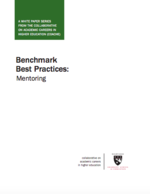
Abstract:
The COACHE surveys of college faculty produce data that are both salient to full-time college faculty and actionable by academic leaders. The survey items are aggregated into 20 benchmarks representing faculty satisfaction. This white paper examines the effectiveness of mentoring within departments, outside departments but at the same institution, and outside the institution.
Mentoring has always been important in the academic workplace. Only in recent years, however, has the practice evolved more widely from incidental to intentional as academic leaders have come to appreciate that mentorship is too valuable to be left to chance.
Many pre-tenure faculty members feel mentoring is essential to their success, but such support is also instrumental for associate professors on their path to promotion. While some institutions rely on the mentor-protégé approach (a senior faculty member formally paired with a junior faculty member), new models encourage mutual mentoring, team mentoring, and strategic collaborations beyond the department.
Benchmark Best Practices: Interdisciplinary Work & Collaboration
Citation:
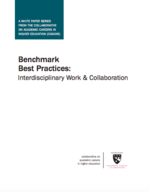
Abstract:
The COACHE surveys of college faculty produce data that are both salient to full-time college faculty and actionable by academic leaders. The survey items are aggregated into 20 benchmarks representing faculty satisfaction. This white paper examines collaboration—within departments, outside of departments but at the same institution, and outside the institution—and attitudes toward interdisciplinary work.
While interest in interdisciplinary work has increased, and this type of work attracts many graduate students and early-career faculty, the academy has not yet fully embraced interdisciplinary work. Unchanged policies, structures and cultures are institutional disincentives, as they are still best-suited to narrower work within disciplines. This includes publication vehicles, multiple authors, peer review, and reward structures.
Perspectives on What Pre-Tenure Faculty Want and What Six Research Universities Provide
Citation:
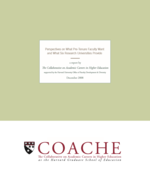
Abstract:
COACHE released this report in conjunction with the Harvard University Office for Faculty Diversity & Development. It is the result of many months of mining and synthesizing the information collected from nearly 80 interviews with pre-tenure and tenured faculty, department chairs, and senior administrators at six COACHE member campuses. Much of what is contained in this report may be all too familiar to an experienced academic administrator, but it is the first time the experiences of early-career faculty and the faculty development policies of top-tier research universities have been assembled in one place.- «
- 5 of 5
The role of citizenship status in intent to leave for pre-tenure faculty
Citation:
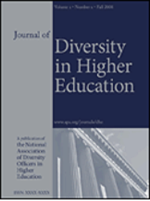
Abstract:
Using a national database, this study uses discriminant analysis to explore the role of citizenship status in determining intent to leave for pre-tenure faculty members at 4-year research universities. Of the three possible responses (intend to stay, intend to leave, and undecided), two functions emerged. The first function differentiates those who intend to stay from those who intend to leave and those who are undecided. The second function differentiates between those who intend to leave and those who are undecided.
Measures of satisfaction with workplace serve as the primary indicators of function one. Race and citizenship status are the only variables significant for function two. Demographic variables, discipline, salary, and institutional variables are not significant in either function. The variables that are significant for the entire sample are similar to those significant just for non-U.S. citizen faculty. Implications of this study for institutions include attending to departmental and institutional fit, recognition of diversity among non-U.S. citizen faculty, and working toward improving various components of satisfaction.
Examining faculty satisfaction, productivity, and collegiality in higher education: Contemporary contexts and modern methods
Citation:
Thesis Type:
DissertationAbstract:
In response to discourse surrounding faculty accountability and diversity, this dissertation describes three studies of faculty satisfaction, productivity, and collegiality in higher education. The studies employed advanced quantitative methods to analyze and interpret faculty data at four-year colleges and universities.
The first study revealed a strong, positive, and highly significant relationship between campus racial climate and faculty satisfaction at the individual level, regardless of gender, race/ethnicity, and tenure status. The second study identified five classes of faculty productivity with respect to gender, race, institutional type, and levels of faculty satisfaction.
The third study examined the relationships among faculty collegiality, job satisfaction, and turnover intentions. Significant findings indicated that faculty collegiality was strongly and positively related to job satisfaction and negatively related to turnover intentions, regardless of gender and race/ethnicity. Women faculty and faculty of color indicated lower levels of collegiality, and faculty of color reported lower job satisfaction and higher turnover intentions.
Success on the Tenure Track: Five Keys to Faculty Job Satisfaction
Citation:
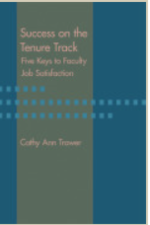
Abstract:
Landing a tenure-track position is no easy task. Achieving tenure is even more difficult. Under what policies and practices do faculty find greater clarity about tenure and experience higher levels of job satisfaction? What makes an institution a great place to work?
In 2005–2006, the Collaborative on Academic Careers in Higher Education surveyed more than 15,000 tenure-track faculty at 200 institutions. The survey was designed around five key themes: tenure clarity, work-life balance, support for research, collegiality, and leadership.
Success on the Tenure Track positions the survey data in the context of actual colleges and universities. Best practices at the highest-rated institutions in the survey—Auburn, Ohio State, North Carolina State, Illinois at Urbana-Champaign, Iowa, Kansas, and North Carolina at Pembroke—give administrators practical, proven advice on increasing employee satisfaction. Additional chapters discuss faculty demographics, trends in employment practices, creating a great workplace for faculty, and the future of tenure.
Senior Faculty Vitality
Citation:

Abstract:
Academic institutions and faculty are pressured today from multiple directions as the federal government demands greater accountability, states cut budgets, tuition payers demand more, granting agencies become more selective and trustees apply more pressure and scrutinize more closely. In this context, this report examines the workplace satisfaction of senior faculty members at seven public research universities.
The vitality, productivity and satisfaction of senior faculty is extremely important to colleges and universities in fulfilling their missions and achieving their goals. One-quarter of senior faculty surveyed feel that the single most important thing colleges and universities can do to improve the workplace revolves around leadership stability and consistency of mission, focus, and priorities. Sixteen percent feel that increased salaries are most important and 14 percent would like more research support.
New Challenges, New Priorities: The Experience of Generation X Faculty
Citation:
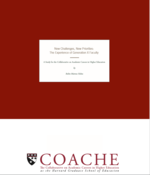
Abstract:
This study explores how Generation X (born 1964-1980) faculty are approaching their jobs, long-term careers, and work-life balance, and examines if and how the generational “clashes” reportedly arising in the workforce are being manifested in the academic environment. The study was designed to complement and build upon the coache Tenure-Track Faculty Job Satisfaction Survey by using qualitative interviews to explore many of the same themes in greater depth with a limited number of participants, and provide insights into how those themes play out in the day-to-day lives of individual faculty members. While the survey provides a snapshot of how tenure-track faculty are feeling about their current job situation, this study examines the broader context of faculty members’ long-term careers, and the interplay between their work and non-work lives.
Perspectives on What Pre-Tenure Faculty Want and What Six Research Universities Provide
Citation:

Abstract:
COACHE released this report in conjunction with the Harvard University Office for Faculty Diversity & Development. It is the result of many months of mining and synthesizing the information collected from nearly 80 interviews with pre-tenure and tenured faculty, department chairs, and senior administrators at six COACHE member campuses. Much of what is contained in this report may be all too familiar to an experienced academic administrator, but it is the first time the experiences of early-career faculty and the faculty development policies of top-tier research universities have been assembled in one place.- «
- 4 of 4
Gender and Race Differences in Faculty Assessment of Tenure Clarity: The Influence of Departmental Relationships and Practices
Citation:
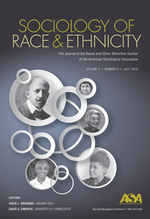
Abstract:
The authors look at how the intersection of gender and race influences pre-tenure faculty members’ perceptions of the clarity of tenure expectations. The authors also seek to identify potential predictors (assessment of mentoring, relationships with peers, feedback on progress toward tenure, and fairness in tenure decision making and evaluation) of perceptions of tenure clarity for four intersectionally defined groups, including historically underrepresented minority women (URMW). The authors use an intersectional perspective and the gendered and racialized organizations’ theoretical lens to interpret the results. The data set comes from the Faculty Job Satisfaction Survey. Findings show that compared with white men, URMW are less satisfied with their relationships with peers and with the fairness in the evaluation of their work. They are also less likely to agree that mentoring is effective, that tenure decisions are fair, and that messages about tenure are consistent.International Faculty Perceptions of Departmental Climate and Workplace Satisfaction
Citation:
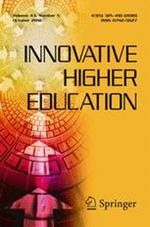
Abstract:
Although the variability in the definitions and immigration status of international academics makes it challenging to provide the exact number of foreign-born faculty members teaching and conducting research in U.S. postsecondary institutions, all data accounts have pointed to a steady growth in this segment of the professoriate. This study used data from the 2011-2014 Faculty Job Satisfaction Survey to examine international faculty members’ satisfaction with autonomy, interactions with colleagues, departmental climate, and recognition and the effect of these elements upon the overall workplace satisfaction of international faculty members relative to their U.S. citizen peers.
This study helps identify factors that can enhance international faculty members’ satisfaction in order to aid institutions in their efforts not only to recruit the best talent but also to support and retain such talent.
Climate Change: Creating Space for Interdepartmental Problem Solving at Skidmore College
Citation:
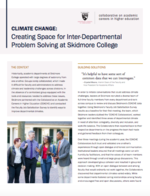
Abstract:
Historically, academic departments at Skidmore College operated with large degrees of autonomy from one another. Groups rarely collaborated, which made it difficult for faculty and administrators to address climate and leadership challenges across divisions. In the absence of a centralized group equipped with the tools and resources needed to address these issues, Skidmore partnered with the Collaborative on Academic Careers in Higher Education (COACHE) and conducted the Faculty Job Satisfaction Survey to identify ways to improve departmental climates.
Using Skidmore’s survey results as a baseline for their first meeting, the team, which Skidmore leaders dubbed the ‘COACHE Collaborators’, worked together to identify three areas of departmental climate in need of attention: collegiality, diversity and inclusion, and work-life balance.
Browse Resources by Faculty Type
Job Satisfaction Among Nursing Faculty in Canada and the United States
Citation:
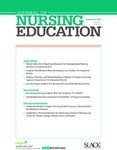
Abstract:
Higher education wants a satisfied workforce to ensure the organization reaches their stated or evolving goals; however, if faculty are dissatisfied, there can be harmful and long-term consequences on productivity and organizational outcome. This study examined nursing faculty's job satisfaction and intent to stay in universities in the United States and Canada.Women Faculty in STEM Disciplines: Experiences with the Tenure Process and Departmental Practices
Citation:
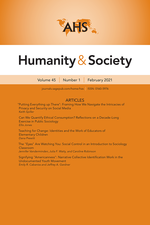
Abstract:
Using Faculty Job Satisfaction Survey data, the purpose of the study is to explore predictors of perceptions of tenure clarity for faculty in STEM and non-STEM fields. We use the gendered organization framework to examine whether for four groups of faculty (women and men in STEM and women and men in non-STEM), assessment of fairness in tenure decisions and evaluations, messages about tenure requirements, mentoring, and relationships with peers have a similar effect on their assessment of tenure clarity. Women in STEM fields are less likely to perceive the expectations for tenure as clear or to assess tenure decisions and evaluations as fair, mentoring as effective, and relationships with peers as satisfactory.College nursing faculty job satisfaction and retention: A national perspective
Citation:
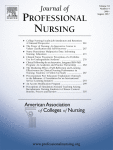
Abstract:
The need for registered nurses in the United States continues to grow. To meet this need for increased numbers of nurses, recruitment and retention of qualified nurse educators has become a priority, and job satisfaction and nursing faculties’ intent to stay have emerged as important considerations for administrators.
The purpose of this study is to analyze variables of relationships with nurse faculty job satisfaction and intent to stay from data collected throughout the United States. The Faculty Job Satisfaction Survey was employed for the purposes of this study. Over 1,350 nurse educators were included in the survey. The findings support a variety of modifiable variables that are viewed as important by nursing faculty. The strongest relationship was found to be institutional leadership. The implications can inform academic administrators seeking to retain nursing faculty.
- 1 of 2
- »
The Art of Diversity: A Chronicle of Advancing the University of California Faculty through Efforts in Diversity, Equity, and Inclusion, 2010–2022
Citation:
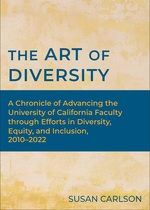
Abstract:
In The Art of Diversity: A Chronicle of Advancing the University of California Faculty through Efforts in Diversity, Equity, and Inclusion, 2010–2022, Susan Carlson details the University of California’s systemwide efforts to increase the diversity of its faculty during her tenure as Vice Provost, UC Office of the President. It tells the story of a remarkable alignment of California stakeholders—from the UC Regents and University leaders to the Academic Senate and the California legislature, from small faculty teams to multicampus coalitions—and how they worked to create a 21st-century faculty that reflects the diversity of California. This chronicle’s central focus is on a community of practice dedicated to excellence and equity. Efforts began with a program focused on finding new ways to collect data on faculty recruitment and create multicampus discussions on key topics like mentoring, intersectional racial and gender identities, workplace climate, and statements on diversity, equity, and inclusion. These efforts continued with a novel interactive theater program for department chairs and deans. The capstone effort, Advancing Faculty Diversity, provides opportunities to pilot new ways to recruit and sustain inclusive and equitable academic communities.
Carlson addresses this central academic issue: how to build a faculty that is different from the past not only in its gender and racial makeup, but also in its research methodologies, transdisciplinary partnerships, and multimodal pedagogies.
Clear as Mud: Promotion Clarity by Gender and BIPOC Status Across the Associate Professor Lifespan
Citation:
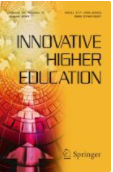
Abstract:
Mid-career faculty members often seek to advance to the highest faculty rank of full professor, but research suggests women and Black, Indigenous and Other People of Color (BIPOC) faculty face inequitable patterns in advancement to the full professor rank. This study focuses on associate professors’ perceptions of promotion clarity, or the degree to which they are clear about the processes and criteria for advancing to the full professor rank.Personal and Institutional Predictors of Work-Life Balance among Women and Men Faculty of Color
Citation:
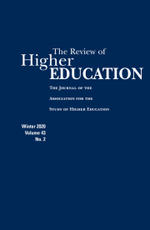
Abstract:
This study examines predictors of perceived work-life balance among women and men faculty of color using data from the Collaborative on Academic Careers in Higher Education (COACHE). Asian American men faculty report higher perceived work-life balance, while African American women faculty report lower perceived work-life balance as compared to other faculty members. Findings from multivariate analyses show that the strongest, most consistent positive predictor of perceived work-life balance was the faculty perception that the institution does what it can to make personal/family obligations and an academic career compatible. The findings offer important implications for institutional and departmental climate and policy.- 1 of 4
- »
Non-Tenure Track Faculty Satisfaction: A Self-Determination Model
Citation:
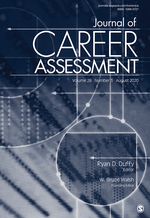
Abstract:
Full-time non-tenure track faculty, commonly referred to as NTT faculty, shoulder much of the teaching load within academic institutions. Self-determination theory (SDT) has shown promise as a conceptual frame for characterizing the relationship between environmental support factors and NTT faculty satisfaction. Full-time NTT faculty were sampled nationwide to investigate an SDT-based model positing basic psychological needs (i.e., volitional autonomy and relatedness) as mediators between six environmental support indices and NTT faculty satisfaction. Structural equation model results showed volitional autonomy and relatedness fully mediated the relationships between the six environmental supports and both indices of faculty satisfaction.Understanding the changing faculty workforce in higher education: A comparison of non-tenure track and tenure line experiences
Citation:

Abstract:
Non-tenure track faculty are a growing majority in American higher education, but research examining their work lives is limited. Moreover, the theoretical frameworks commonly used by scholars have been critiqued for reliance on ideologically charged assumptions. Using a conceptual model developed from Hackman and Oldham’s (1980) Job Characteristics Model (JCM) and prior research on faculty workplace experiences, this study considers the extent to which full-time non-tenure track and tenure line faculty share a professionalized approach to their jobs, working conditions, and how this is associated with their organizational commitment.
Satisfaction with resources, rewards, autonomy and feedback had a significant positive relationship with odds of organizational commitment for all faculty groups. Overall, the results suggest being removed from the tenure track is not associated with faculty viewing their jobs in a substantially different way than those in tenure line positions, which underscores the importance of conceptualizing full-time faculty work as an integrated whole.
Work–Family Balance and Tenure Reasonableness: Gender Differences in Faculty Assessment
Citation:
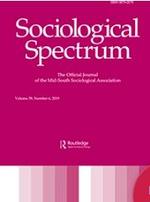
Abstract:
Perceptions of work–family balance and of the reasonableness of tenure expectations are key faculty retention factors. Using the Faculty Job Satisfaction Survey, which includes data from 2,438 tenure-track assistant professors, Rodica Lisnic, Anna Zajicek, and Brinck Kerr explore whether faculty assessment of departmental and institutional support for family influences their perceptions of the reasonableness of tenure expectations.
Results reveal that women are less likely than men to report tenure expectations as scholars are reasonable and that departments and institutions are supportive of family-work balance. Departmental support for family-work balance, caring for an ill family member, satisfaction with family-friendly policies, and workload have the strongest association with reasonableness. Satisfaction with family-friendly policies has a significant relationship with reasonableness of tenure expectations only for faculty with family care responsibilities. These results have implications for family-friendly policies and practices in academia.
Gender and Race Differences in Faculty Assessment of Tenure Clarity: The Influence of Departmental Relationships and Practices
Citation:

Abstract:
The authors look at how the intersection of gender and race influences pre-tenure faculty members’ perceptions of the clarity of tenure expectations. The authors also seek to identify potential predictors (assessment of mentoring, relationships with peers, feedback on progress toward tenure, and fairness in tenure decision making and evaluation) of perceptions of tenure clarity for four intersectionally defined groups, including historically underrepresented minority women (URMW). The authors use an intersectional perspective and the gendered and racialized organizations’ theoretical lens to interpret the results. The data set comes from the Faculty Job Satisfaction Survey. Findings show that compared with white men, URMW are less satisfied with their relationships with peers and with the fairness in the evaluation of their work. They are also less likely to agree that mentoring is effective, that tenure decisions are fair, and that messages about tenure are consistent.Gender Differences in Faculty Member Job Satisfaction: Equity Forestalled?
Citation:

Abstract:
Guided by Hagedorn’s (2000) theory of faculty job satisfaction, mindful of social and organizational structures of higher education, and acknowledging recent changes in the academic labor market, this study examines satisfaction for approximately 30,000 tenured and tenure-track faculty members in 100 US colleges and universities. Findings revealed similarity between female and male faculty members in some aspects of work satisfaction, but difference in other areas in which women reported lower satisfaction. Findings also revealed that perceptions of department fit, recognition, work role balance, and mentoring are more important to women faculty’s satisfaction than male peers. These findings have implications for policy and practice.
- 1 of 6
- »
Gender Differences in Faculty Member Job Satisfaction: Equity Forestalled?
Citation:

Abstract:
Guided by Hagedorn’s (2000) theory of faculty job satisfaction, mindful of social and organizational structures of higher education, and acknowledging recent changes in the academic labor market, this study examines satisfaction for approximately 30,000 tenured and tenure-track faculty members in 100 US colleges and universities. Findings revealed similarity between female and male faculty members in some aspects of work satisfaction, but difference in other areas in which women reported lower satisfaction. Findings also revealed that perceptions of department fit, recognition, work role balance, and mentoring are more important to women faculty’s satisfaction than male peers. These findings have implications for policy and practice.
Beyond Teaching and Research: Faculty Perceptions of Service Roles at Research Universities
Citation:
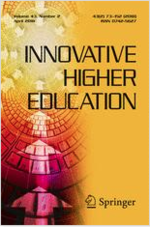
Abstract:
Faculty members in higher education institutions frequently have the responsibility of providing service activities to their institutions, professional societies, and external communities. This responsibility, however, generally carries little reward in the workplace and does not play a major role in promotion criteria. This study drew upon a sample of 4,400 research university faculty members surveyed through the Faculty Job Satisfaction Survey to explore their satisfaction with service roles by academic rank. Findings showed that mid-career faculty members at the associate professor rank were significantly less satisfied with their service functions, including workload, equity, work balance, recognition, and institutional support, when compared with both assistant and full professors.
Understanding the changing faculty workforce in higher education: A comparison of non-tenure track and tenure line experiences
Citation:

Abstract:
Non-tenure track faculty are a growing majority in American higher education, but research examining their work lives is limited. Moreover, the theoretical frameworks commonly used by scholars have been critiqued for reliance on ideologically charged assumptions. Using a conceptual model developed from Hackman and Oldham’s (1980) Job Characteristics Model (JCM) and prior research on faculty workplace experiences, this study considers the extent to which full-time non-tenure track and tenure line faculty share a professionalized approach to their jobs, working conditions, and how this is associated with their organizational commitment.
Satisfaction with resources, rewards, autonomy and feedback had a significant positive relationship with odds of organizational commitment for all faculty groups. Overall, the results suggest being removed from the tenure track is not associated with faculty viewing their jobs in a substantially different way than those in tenure line positions, which underscores the importance of conceptualizing full-time faculty work as an integrated whole.
Clear as Mud: Promotion Clarity by Gender and BIPOC Status Across the Associate Professor Lifespan
Citation:

Abstract:
Mid-career faculty members often seek to advance to the highest faculty rank of full professor, but research suggests women and Black, Indigenous and Other People of Color (BIPOC) faculty face inequitable patterns in advancement to the full professor rank. This study focuses on associate professors’ perceptions of promotion clarity, or the degree to which they are clear about the processes and criteria for advancing to the full professor rank.Women Faculty in STEM Disciplines: Experiences with the Tenure Process and Departmental Practices
Citation:

Abstract:
Using Faculty Job Satisfaction Survey data, the purpose of the study is to explore predictors of perceptions of tenure clarity for faculty in STEM and non-STEM fields. We use the gendered organization framework to examine whether for four groups of faculty (women and men in STEM and women and men in non-STEM), assessment of fairness in tenure decisions and evaluations, messages about tenure requirements, mentoring, and relationships with peers have a similar effect on their assessment of tenure clarity. Women in STEM fields are less likely to perceive the expectations for tenure as clear or to assess tenure decisions and evaluations as fair, mentoring as effective, and relationships with peers as satisfactory.Work–Family Balance and Tenure Reasonableness: Gender Differences in Faculty Assessment
Citation:

Abstract:
Perceptions of work–family balance and of the reasonableness of tenure expectations are key faculty retention factors. Using the Faculty Job Satisfaction Survey, which includes data from 2,438 tenure-track assistant professors, Rodica Lisnic, Anna Zajicek, and Brinck Kerr explore whether faculty assessment of departmental and institutional support for family influences their perceptions of the reasonableness of tenure expectations.
Results reveal that women are less likely than men to report tenure expectations as scholars are reasonable and that departments and institutions are supportive of family-work balance. Departmental support for family-work balance, caring for an ill family member, satisfaction with family-friendly policies, and workload have the strongest association with reasonableness. Satisfaction with family-friendly policies has a significant relationship with reasonableness of tenure expectations only for faculty with family care responsibilities. These results have implications for family-friendly policies and practices in academia.
- 1 of 5
- »
Browse Resources by Type
Using the Faculty Job Satisfaction Survey to Improve Equity for Texas Tech Faculty
Citation:
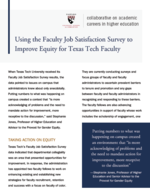
Abstract:
Upon receiving their Faculty Job Satisfaction Survey results, Texas Tech University set to work addressing some of the equity gaps brought to light. Among their priorities was departmental collegiality, diversity and equity across divisions, and department chair training. By creating two faculty fellow positions and a team Faculty Equity Advocates, Texas Tech is set to make meaningful changes on their campus.Tailoring a Survey for Campus Change at the University of Denver
Citation:
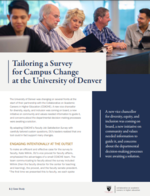
Abstract:
The University of Denver was changing on several fronts at the start of their partnership with the Collaborative on Academic Careers in Higher Education (COACHE). A new vice chancellor for diversity, equity, and inclusion was coming on board, a new initiative on community and values needed information to guide it, and concerns about the departmental decision-making processes were awaiting a solution.
By adapting COACHE’s Faculty Job Satisfaction Survey with carefully tailored custom questions, DU’s leaders realized that one tool could in fact support many changes.
Building Trust, Engaging Faculty, Taking Action: Supporting the Next Generation of Faculty at Georgia State University
Citation:
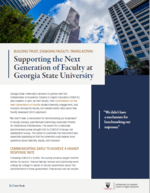
Abstract:
Georgia State University decided to partner with COACHE after the university’s Commission on the Next Generation of Faculty urged the institution to gather more robust data on diversity, equity, and inclusion on campus. The provost’s office made three guarantees to faculty about the Faculty Job Satisfaction Survey: the administration wanted to hear from every full-time faculty member, they would not receive data that would allow them to identify any individual faculty member, and they would use the results for campus improvement. This transparancy has already borne fruit. With a higher response rate than peer institutions and a renewed sense of trust, GSU administrators are moving forward in unpacking the results collaboratively with their faculty.- 1 of 2
- »
The Art of Diversity: A Chronicle of Advancing the University of California Faculty through Efforts in Diversity, Equity, and Inclusion, 2010–2022
Citation:

Abstract:
In The Art of Diversity: A Chronicle of Advancing the University of California Faculty through Efforts in Diversity, Equity, and Inclusion, 2010–2022, Susan Carlson details the University of California’s systemwide efforts to increase the diversity of its faculty during her tenure as Vice Provost, UC Office of the President. It tells the story of a remarkable alignment of California stakeholders—from the UC Regents and University leaders to the Academic Senate and the California legislature, from small faculty teams to multicampus coalitions—and how they worked to create a 21st-century faculty that reflects the diversity of California. This chronicle’s central focus is on a community of practice dedicated to excellence and equity. Efforts began with a program focused on finding new ways to collect data on faculty recruitment and create multicampus discussions on key topics like mentoring, intersectional racial and gender identities, workplace climate, and statements on diversity, equity, and inclusion. These efforts continued with a novel interactive theater program for department chairs and deans. The capstone effort, Advancing Faculty Diversity, provides opportunities to pilot new ways to recruit and sustain inclusive and equitable academic communities.
Carlson addresses this central academic issue: how to build a faculty that is different from the past not only in its gender and racial makeup, but also in its research methodologies, transdisciplinary partnerships, and multimodal pedagogies.
Job Satisfaction Among Nursing Faculty in Canada and the United States
Citation:

Abstract:
Higher education wants a satisfied workforce to ensure the organization reaches their stated or evolving goals; however, if faculty are dissatisfied, there can be harmful and long-term consequences on productivity and organizational outcome. This study examined nursing faculty's job satisfaction and intent to stay in universities in the United States and Canada.Cross-cultural mentoring in higher education: the use of a cultural identity development model
Citation:
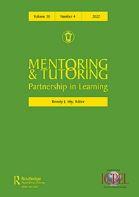
Abstract:
This article examines the role that cultural identity development plays in understanding cross-cultural mentoring encounters between White faculty and faculty of color. The authors present the components of a conceptual framework for developing mentoring approaches that consider a person’s cultural identity stage of development. Using a systematic approach, the authors consider the fundamental principles of cultural identity development theory combined with higher education contextual conditions, resulting in an approach by which mentors and protégés could govern their interactions. The article concludes with implications for mentoring program administrators, faculty, and leaders in higher education.- 1 of 18
- »
COVID-19 Impact Study: Technical Report
Citation:
Abstract:
The findings from a series of statistical analyses present compelling evidence that the disruption to campus operations caused by the coronavirus (COVID-19) in March 2020 impacted faculty perceptions of some aspects of their campus environment. This impact was felt across all institutions that participated in the COACHE Faculty Job Satisfaction Survey (JSAT) for a subset of JSAT benchmarks and specific items. At the same time, some benchmarks and most items were unaffected. The majority of the benchmarks and items that were impacted concerned leadership, governance, and decision-making. Additional analyses of the differences between benchmark scores with and without the presence of post-disruption responses suggest that the degree of change with the inclusion of post-disruption responses is negligible in practical application and does not warrant additional data cleaning for valid interpretation of report findings.Selected Dimensions of the Faculty Workplace Experience
Citation:
Abstract:
In conjunction with the AAC&U Annual Meeting, COACHE is providing access to digital spreadsheets summarizing results from its Faculty Job Satisfaction Survey, including responses from approximately 43,000 faculty at 2- and 4-year colleges and universities. COACHE Summary Tables 2019 provides responses organized by major Carnegie Classification and disciplinary groups, then by faculty rank (and tenure status), race/ethnicity, or gender. The following tables were extracted from COACHE Summary Tables 2019 for use in our discussion.COACHE Summary Tables 2019: Selected Dimensions of the Faculty Workplace Experience
Citation:
Abstract:
These summary tables include data from the 2019 Faculty Job Satisfaction Survey, focusing on the faculty workplace experience, with data presented by institution type, discipline, rank (with tenure status), race/ethnicity, and gender. Survey dimensions shown in the summary tables include questions about the nature of faculty work, facilities and family resources, interdisciplinary work, tenure clarity, promotion, and shared governance.Full Text
Access the 2019 summary tables
- 1 of 3
- »
Examining the Impacts of COVID-19 on Faculty Retention & Exit
Citation:
Abstract:
For the last five years, the Collaborative on Academic Careers in Higher Education (COACHE) has been conducting the Faculty Retention and Exit Survey to gain a deeper understanding of the academic work environment by examining faculty mobility. In spring 2020, we added three COVID-19-related questions to the survey to capture the early effects of the pandemic.
In this webinar, Doctoral Fellow, Mai H. Vang, presents findings from the responses to those questions, which captured nine themes, including disruption of research, disconnection due to remote work, and inequities in the pandemic’s impact on particular faculty.
Download the full report of our findings and presentation slides
Full Text
Assessing the Needs of Part-Time Faculty: Lessons Learned from the University at Buffalo
Citation:
Abstract:
According to the American Association of University Professors (AAUP), approximately 40% of all faculty across all institutional types are now part-time. This subset of adjunct faculty is fulfilling a critical role in the higher education landscape, yet the variability of these appointments makes it exceedingly difficult to assess their needs and, ultimately, provide adequate support.
In 2017, COACHE partners at the University at Buffalo set out to address this knowledge gap by adapting the Faculty Job Satisfaction Survey to suit the needs of their part-time faculty. In this webinar, Robert Granfield and Tilman Baumstark will share the challenges faced and lessons learned, both from their methodology and from their faculty, throughout this endeavor.
Success After Tenure: Lessons in Engaging Midcareer Faculty
Citation:
Abstract:
Mid-career faculty actively seek professional satisfaction and personal well-being in their careers at the departmental and institutional level. However, a growing body of research tells us that the policies and practices in place at colleges and universities do not always support this goal. This webinar, “Success After Tenure: Lessons in Engaging Mid-Career Faculty,” offers an inside take on the themes of the book Success After Tenure: Supporting Mid-Career Faculty and provide real-world best practices from practitioners in the field.
Full Text
Watch the Recording
Download the presentation slides
- 1 of 2
- »
Faculty Departure and Retention at Small Liberal Arts Colleges
Citation:
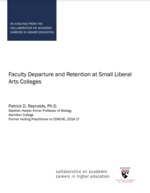
Abstract:
Voluntary faculty departures can often be prevented, but a lack of common exit procedures have hindered institutions’ ability to create proactive practices of faculty retention and instead harbor reactive tendencies with little positive outcome. Through interviews with 22 CAOs at liberal arts colleges, Patrick D. Reynolds, former Visiting Practitioner to COACHE, discovered partner employment and career choice were the two most prominent reasons for departures. Outliers also revealed that work and social environments, especially for faculty members of minority groups, often played a role in dissatisfaction.
Effective Academic Governance: Five Ingredients for CAOs and Faculty
Citation:
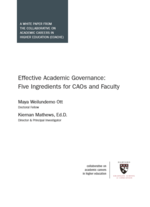
Abstract:
The COACHE research-practice partnership is designed to enact organizational change for the benefit of faculty and, by extension, the institution. But does every college's system of shared governance have what it takes to meet their own or, indeed, higher education’s most pressing challenges? This white paper looks beyond the rhetoric toward a more differentiated understanding of the ingredients of effective academic governance. Ott and Mathews offer a five-factor framework grounded in the literature, developed from interviews, and, now, tested in a survey of thousands of faculty. The report concludes with advice for assessing and fostering the qualities of “hard” and “soft” governance practices essential to sustainable change in the “real world” decision-making of committees, assemblies, senates, councils, and unions.Benchmark Best Practices: Tenure and Promotion
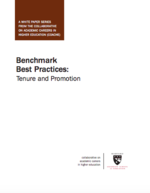
Abstract:
The COACHE surveys of college faculty produce data that are both salient to full-time college faculty and actionable by academic leaders. The survey items are aggregated into 20 benchmarks representing the general thrust of faculty satisfaction along key themes. This white paper discusses the themes of tenure policies, tenure clarity, and promotion.
Administrators and faculty alike acknowledge that, at most institutions, the bar to achieve tenure has risen over time. While it is impossible to eliminate anxiety from the minds of all pre-tenure faculty members, or the pressures exerted on their lives en route to tenure, academic leaders can improve the clarity of tenure policies and expectations without sacrificing rigor. And while the academy has recently improved many policies for assistant professors (e.g., research leave; stop-the-tenure-clock; part-time tenure-track options), it has done far less for associate professors. Ideas have emerged from COACHE research on tenured faculty.
- 1 of 5
- »

